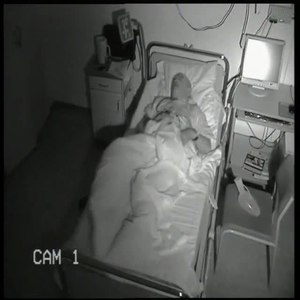Rapid eye movement sleep behaviour disorder
| Rapid eye movement sleep behavior disorder | |
|---|---|
| Sleep talking in a patient with RBD | |
| Classification and external resources | |
| Specialty | Psychiatry, Sleep medicine |
| ICD-10 | G47.8 |
| MeSH | D020447 |
Rapid eye movement sleep behavior disorder (RBD) is a sleep disorder (more specifically a parasomnia) that involves abnormal behavior during the sleep phase with rapid eye movement (REM) sleep. It was first described in 1986.
The major and arguably only abnormal feature of RBD is loss of muscle atonia (i.e., the loss of paralysis) during otherwise intact REM sleep (during which paralysis is not only normal but necessary). REM sleep is the stage of sleep in which most vivid dreaming occurs. The loss of motor inhibition leads to a wide spectrum of behavioral release during sleep. This extends from simple limb twitches to more complex integrated movement, in which people appear to be unconsciously acting out their dreams. These behaviors can be violent in nature and in some cases will result in injury to either the patient or their bed partner.
RBD is characterized by the dreamer acting out his or her dreams. These dreams often involve kicking, screaming, punching, grabbing, and even jumping out of bed. When awakened, people can usually recall the dream they were having, which will match the actions they were performing, but they will not be aware that they were moving. In a normal sleep cycle, REM sleep may be experienced at intervals of between 90 minutes and two hours every night, which means RBD episodes may occur up to four times a night. In a rare case, they may only happen once a week or once a month. Episodes occur more towards the morning hours because that is when REM sleep is more frequent. The actions in an episode can result in injuries to oneself or one's bed partner. People can also respond to other people while sleeping and not even know it. This causes them to be aware of things while they are sleeping, which can result in sleep deprivation.
Rapid eye movement behavior disorder (RBD) occurs when there is a loss of normal voluntary muscle atonia during REM sleep resulting in motor behavior in response to dream content. It can be caused by adverse reactions to certain drugs or during drug withdrawal; however, it is most often associated with the elderly and in those with neurodegenerative disorders such as Parkinson disease and other neurodegenerative diseases, for example multiple system atrophy and Lewy body dementia.
...
Wikipedia

